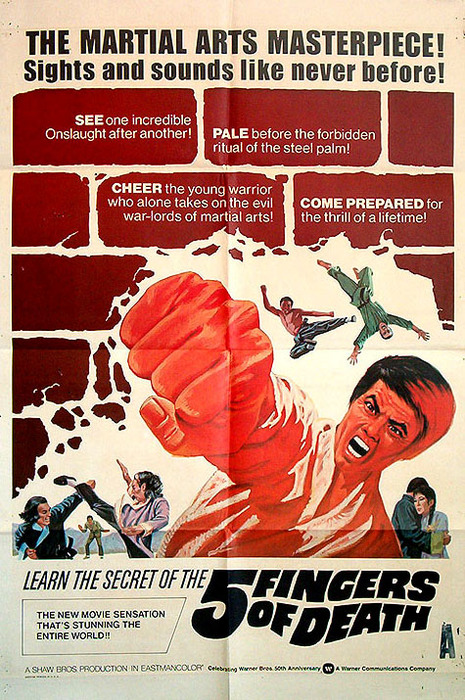
Five Fingers of Death (1972). This poster hung in Jacob Barber’s bedroom.
Official website of the author

Five Fingers of Death (1972). This poster hung in Jacob Barber’s bedroom.
“I think ‘taste’ is a social concept and not an artistic one. I’m willing to show good taste, if I can, in somebody else’s living room, but our reading life is too short for a writer to be in any way polite. Since his words enter into another’s brain in silence and intimacy, he should be as honest and explicit as we are with ourselves.”
— John Updike, Hugging the Shore
“The advice I like to give young artists, or really anybody who’ll listen to me, is not to wait around for inspiration. Inspiration is for amateurs; the rest of us just show up and get to work. If you wait around for the clouds to part and a bolt of lightning to strike you in the brain, you are not going to make an awful lot of work. All the best ideas come out of the process; they come out of the work itself. Things occur to you. If you’re sitting around trying to dream up a great art idea, you can sit there a long time before anything happens. But if you just get to work, something will occur to you and something else will occur to you and something else that you reject will push you in another direction. Inspiration is absolutely unnecessary and somehow deceptive. You feel like you need this great idea before you can get down to work, and I find that’s almost never the case.”
Chuck Close (via)
And gentlemen in England now a-bed
Thrilling, though I’ve seen it a thousand times. (Unabridged text here.) Today is St. Crispin’s Day, October 25, the day that “shall ne’er go by, / From this day to the ending of the world, / But we in it shall be remember’d.”
Heading down to New York today for lunch with my U.S. and U.K. editors. Which seems like a good enough excuse to post one of Joseph Holmes’ wonderful images of New York and recommend you stop by his photo blog, Joe’s NYC, a portfolio of amazing street photography. (A few of my favorites are here, here and here. The image above lives here.)
So what are books good for? My best answer is that books produce knowledge by encasing it. Books take ideas and set them down, transforming them through the limitations of space into thinking usable by others.… [T]he two cultures of the contemporary world are the culture of data and the culture of narrative. Narrative is rarely collective. It isn’t infinitely expandable. Narrative has a shape and a temporality, and it ends, just as our lives do. Books tell stories. Scholarly books tell scholarly stories.
— William Germano
Read the whole essay here. I’m not sure there’s really anything new in it, but it is an interesting consideration of what the word “book” means in the digital era and a good case for the continuing relevance of the codex — you know, the kind of book made out of paper, ink and glue. (via ALD)
“A novel can educate to some extent, but first a novel has to entertain. That’s the contract with the reader: you give me ten hours and I’ll give you a reason to turn every page. I have a commitment to accessibility. I believe in plot. I want an English professor to understand the symbolism while at the same time I want the people I grew up with — who may not often read anything but the Sears catalog — to read my books.”